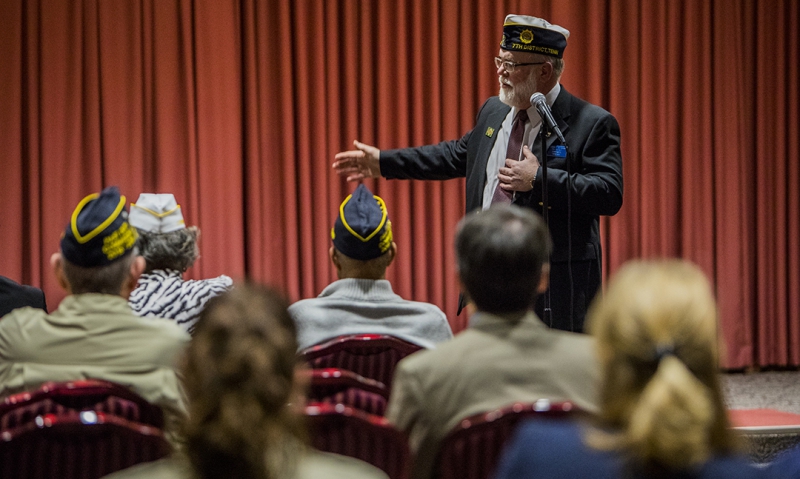
Tennessee veterans voice praise, concern about local VA
More than 20 American Legion Department of Tennessee leaders, veterans and others shared personal experiences and recommendations for improving the VA Tennessee Valley Healthcare System during a System Worth Saving (SWS) town hall meeting March 6 in Murfreesboro.
The town hall, held at the Bradley Academy Museum and Cultural Center, was hosted by staff from The American Legion’s Veterans Affairs and Rehabilitation Division. “We truly believe the VA is a system worth saving,” said Roscoe Butler, VA&R deputy director of health care. “We host these town hall meetings so that we can hear firsthand from veterans about what’s going on at the VA hospital – what’s good, what’s not so good. And then we meet with the executive leadership and their team to talk about what we can do to help improve the system.”
Cecil “Ray” Dye, chaplain for the Department of Tennessee, said he couldn’t be more pleased with the state’s VA healthcare system. Having visited five different facilities over the past 12 years, Dye said he is impressed with the overall quality of care and compassion that employees show to patients at the hospital in Murfreesboro.
“I (am happy to see) the (positivity), the compassion, the (care) that (the VA hospital staff have shown) here in Murfreesboro,” he said. “Murfreesboro is wonderful. I thank God for them.”
As the immediate past department commander who now serves as a veterans service officer for the county, James Patterson agreed that the Murfreesboro facility is still the best compared to other VA hospitals throughout Tennessee. Patterson said about 95 percent of his experiences have been positive. Jim Bachman, the department's public relations chairman, agreed.
“I have never been serviced by the VA. However, I have had a relationship with our local hospital for almost six years,” Bachman said. “I will back what (Ray Dye) said about the compassion, the care and the concerns those nurses and those people (show there). I recently became involved with the hospice ward and I (am beginning) to see the same care, compassion and concern for those patients.”
For American Legion Post 78 member Harold Cunningham, his experiences have not been so good. Cunningham, who served on the flight line for 20 years, said he was denied of hearing aids after the VA conducted a hearing test and determined he was ineligible. “They said ‘we’ll put the paperwork in,' which they did (but) they sent it back and said they couldn’t find any cause by the military for me to have hearing aids,” he said. “I sent it back to them and they rejected it again ... I had the VBA (Veteran Benefits Administration) working on it but I think we’ve hit a dead end there, too.”
Butler asked VA representatives in the audience, whom included VA Tennessee Valley Health System Director Jennifer Vedral-Baron and associate director Ronnie Smith, to connect with Cunningham and further assist with his issue.
“Our veterans deserve the benefits that they earned through their military service,” Butler said. “Hearing aids can be issued to veterans (including) non-service connected veterans. But when (VA) applies their stringent medical criteria … then it’s based upon medical and clinical evidence.”
On the subject of death, Butler mentioned an incident from November 2016 where an Army veteran committed suicide outside the Murfreesboro medical campus after he had been forced out of an inpatient program for addiction, despite struggling with post-traumatic stress disorder and depression, according to an online news report from WSMV-TV in Nashville.
“The best thing we have found about suicide prevention is one-on-one (interaction) with somebody that has experienced what you have experienced (and) understands where you’re coming from,” said a veteran service officer in the audience. “It may be going to visit some Saturday afternoon. It may be having that person over your house. It may be, in our case, (driving) to that person. It’s better than any kind of counseling. I’ve seen it work.”
The Legion’s VA&R team visited the Murfreesboro campus on March 7 and 8, where they met with program managers and conducted interviews with employees and supervisors about the strengths, weaknesses and opportunities for improvement throughout the system. That information, along with material gathered from the town hall meeting, was used in a conversation with the executive staff to discuss challenges and best practices.
During the site visit, Baron informed the VA&R team that an extensive review of the November 2016 suicide incident was conducted, but could not disclose any details about it due to confidentiality/patient privacy laws.
“We need to make sure that VA is doing everything that they can do as our returning soldiers come back from combat,” Butler said. “We want to make sure that they’re getting the proper care and treatment and the counseling they need so that they do not wind up becoming a number, or one of those statistics.”
Once the team has examined how the Tennessee VA facilities use resources, noting the successes, challenges and limitations, these observations will be compiled into an SWS report that is distributed to members of Congress and VA officials, and posted on the Legion's website. The information is then used to urge Congress and the presidential administration to fully fund VA at a level that will enable all eligible veterans to receive quality healthcare in a timely manner.
Butler said The American Legion does not want to see VA become privatized or turned into a public/private healthcare system.
“One of the things that The American Legion can do that the VA can’t is that we can advocate at the local level, as well as the national level, to make sure that the medical center has the resources, the funding (and) all of the right equipment to ensure that they can take care of our nation’s veterans,” he said.
